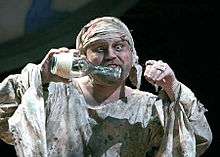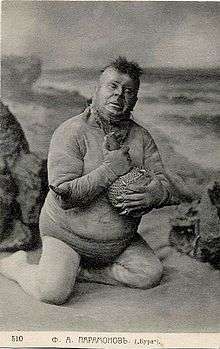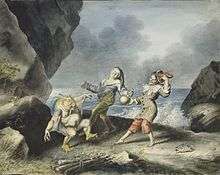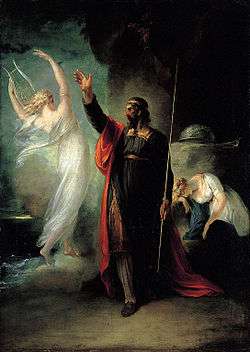Caliban
| Caliban | |
|---|---|
| The Tempest character | |
 Caliban (Todd Scofield) has a conversation with his imaginary friends in Folger Theatre's production of Shakespeare's The Tempest in 2007. | |
| Created by | William Shakespeare |
| Information | |
| Family | Sycorax (Mother) |
Caliban (/ˈkælɪbæn/ KAL-i-ban), son of the witch Sycorax, is an important character in William Shakespeare's play The Tempest.
His character is one of the few Shakespearean figures to take on a life of its own "outside" Shakespeare’s own work:[1] as Russell Hoban put it, "Caliban is one of the hungry ideas, he's always looking for someone to word him into being...Caliban is a necessary idea".[2]
Character
Half human, half monster, after his island becomes occupied by Prospero and his daughter Miranda, Caliban is forced into servitude.[3] While he is referred to as a calvaluna or mooncalf, a freckled monster, he is the only human inhabitant of the island that is otherwise "not honour'd with a human shape" (Prospero, I.2.283).[4] In some traditions he is depicted as a wild man, or a deformed man, or a beast man, or sometimes a mix of fish and man, a dwarf or even a tortoise.[5]
Banished from Algiers, Sycorax was left on the isle, pregnant with Caliban, and died before Prospero's arrival. Caliban, despite his inhuman nature, clearly loved and worshipped his mother, referring to Setebos as his mother's god, and appealing to her powers against Prospero.[6] Prospero explains his harsh treatment of Caliban by claiming that after initially befriending him, Caliban attempted to rape Miranda. Caliban confirms this gleefully, saying that if he had not been stopped he would have peopled the island with a race of Calibans[7]—"Thou didst prevent me, I had peopled else this isle with Calibans" (Act I:ii). Prospero then entraps Caliban and torments him with harmful magic if Caliban does not obey his orders. Resentful of Prospero, Caliban takes Stephano, one of the shipwrecked servants, as a god and as his new master. Caliban learns that Stephano is neither a god nor Prospero's equal in the conclusion of the play, however, and Caliban agrees to obey Prospero again.
Despite this portrayal, Caliban also has moments in which he delivers memorable speeches, such as in Act 3, Scene 2:
Be not afeard; the isle is full of noises
Sounds, and sweet airs, that give delight and hurt not.
Sometimes a thousand twangling instruments
Will hum about mine ears; and sometime voices
That, if I then had waked after long sleep,
Will make me sleep again; and then in dreaming,
The clouds me thought would open, and show riches
Ready to drop upon me, that when I waked
I cried to dream again.
Other works
Postcolonial
The later twentieth century saw the image of Caliban serving as a focus for thinking about the colonial and postcolonial situations. Since ‘’Prospero and Caliban’’ (1954) by Oscar Mannoni, Caliban has been seen as a symbol of the colonial oppressed, both in productions of ‘’The Tempest’’ and in adaptations:[8] thus for example Caliban is the protagonist of Aimé Césaire's 1969 play A Tempest, in which he is a black slave in rebellion against his white master Prospero.
While some 21st century critics have come to see this as an outdated allegory, considerations of race, status, (and even gender) continue to affect the casting of Caliban in modern productions.[9]
Miscellaneous

In the 1844 preface to his main work, World as Will and Representation, the philosopher Schopenhauer refers to Hegel as a "spiritual Caliban".
In the film Clash of the Titans, the main antagonist is a character based on Caliban named Calibos (Kalibos in the novel), the evil son of the sea goddess, Thetis, transformed by Zeus from a handsome man into a monster as punishment for his malevolence.
In the 1956 science fiction film Forbidden Planet, Caliban is re-imagined as "the Monster from the Id", a wild and violent monster that is invisible to the naked eye. The monster later turns out to be born of the subconscious of the film's Prospero character, Dr. Morbius, using the advanced technology of the Krell. Like Caliban, the monster ultimately rebels and attempts to kill its master. Captain Adams confronts Dr. Morbius with the fact that he is giving form to his subconscious, and his guilty conscience, from having brought it into existence, finally ends the monster's destructive rampage.
In John Fowles's 1963 novel The Collector, Miranda refers to her kidnapper as Caliban.
In J.G. Ballard's 1965 novel The Drought, Lomax refers to Quilter as his Caliban.
In the 1965 movie Doctor Zhivago, during the scene where Victor Komarovsky convinces Zhivago to allow him to rescue Lara by taking her to Vladivostok, Komarovsky refers to himself as a Caliban: "Do you accept the protection of this ignoble Caliban on any terms that Caliban cares to make?"
Caliban was the central character in James Clouser's rock ballet Caliban, a 90-minute adaptation of The Tempest that was scored with live performances by St. Elmo's Fire (band). The rock ballet was performed in Houston, Dallas, and Chicago in 1976 and 1977.[10][11]
Caliban appears as the wild and lustful Greek Kalibanos (played by Raúl Juliá) in Paul Mazursky's film adaptation Tempest (1982).
In the Swedish 1989 film The Journey to Melonia, an animated film loosely inspired by The Tempest, there is a character named Caliban, a creature whose face consists of mainly vegetables. Unlike Caliban in The Tempest, this Caliban is kind at heart, and even becomes a hero later in the film.
Caliban is featured as an antagonist in Dan Simmons' Ilium/Olympos duology (2003, 2005).
Rob Thurman's Cal Leandros series (first published 2006) centres around Caliban "Cal" Leandros, a half-human, half-Auphe (a nightmarish monster) hybrid who kills monsters for fun and cash in NYC with his human brother and their sleazy cohort, car-salesman Robin Goodfellow. This Cal struggles for control every day against his monster half, dealing with sarcasm and dark humor.
Adrian Herrero danced Caliban in the choreographic adaptation of The Tempest (La Tempestad) by the Ballet Contemporáneo of the Teatro General San Martín in Buenos Aires, Argentina, in 2008.
In the 2010 film adaptation, Caliban is portrayed by Djimon Hounsou.
In Caliban's Redemption, a collection of prose-poetry by David W. Parry,[12] Caliban is developed as a heathen character, representing magical freedom and the inspiration, found through a free imagination.
The 2012 Summer Olympics opening ceremony (directed by Danny Boyle) titled Isles of Wonder (a name inspired by The Tempest) was heavily influenced by The Tempest. The musical piece played during the torch lighting ceremony was entitled "Caliban's Dream", and Caliban's monologue from Act 3, Scene ii was quoted by Kenneth Branagh in character as Isambard Kingdom Brunel at the start of the Industrial Revolution set piece. "And I Will Kiss", the title of another specially commissioned track from the ceremony, is also a quote from The Tempest (2:2:148-149). These two songs also appeared on the ceremony's official soundtrack. The 2012 Summer Olympics closing ceremony also featured a recitation of the same monologue, this time by Timothy Spall playing Winston Churchill.
Name

There is a long history of enthusiastic speculation on the name's origin or derivation.
One of the most prominent suggestions concerns Caliban being an anagram of the Spanish word canibal (Carib people), the source of cannibal in English. The character may be seen as a satire on "Noble cannibal" from Montaigne's Essays (A.30, "Of Cannibals").[13]
Also popular has been comparison to kaliban or cauliban in the Romani language, which mean black or with blackness.[14][15][16][17] The first gypsies had arrived in England a century before Shakespeare's time.[18]
Many other, though less notable, suggestions have been made, primarily in the 19th century, including an African town Calibia, an Arabic word for "vile dog", a Hindu Kalee-ban "satyr of Kalee, the Hindoo Proserpine", German Kabeljau ("codfish"), etc.[19]
See also
References
- ↑ P. Hulme ed., The Tempest and its Travels (London 2000) p. xiii
- ↑ Quoted in P. Hulme ed., The Tempest and its Travels (London 2000) p. xii
- ↑ A Vaughan, ‘’Shakespeare’s Caliban’’ (Cambridge 1991) p. 9
- ↑ A Vaughan, ‘’Shakespeare’s Caliban’’ (Cambridge 1991) p. 10
- ↑ A Vaughan, ‘’Shakespeare’s Caliban’’ (Cambridge 1991) p. 13-4
- ↑ P. Hulme ed., ‘’The Tempest and its Travels’’ (London 2000) p. 100ii
- ↑ P. Hulme ed., ‘’The Tempest and its Travels’’ (London 2000) p. 231-2
- ↑ D Lindley ed., ‘’The Tempest’’ (Cambridge 2013) p. 70-1
- ↑ D Lindley ed., ‘’The Tempest’’ (Cambridge 2013) p. 77-82
- ↑ Guthrie, Norie. "Wheatfield Biography". Houston Folk Music Archive.
- ↑ Shelton, Suzanne (August 1976). ""Caliban": James Clouser's "Tempest" in Houston". Dance Magazine.
- ↑ "Review of 'Caliban's Redemption' by David Parry". Charlotte Rodgers' Web Site. Archived from the original on 9 March 2016. Retrieved 11 July 2016.
- ↑ Ward, Adolphus William (1 January 1997). "A History of English Dramatic Literature". Atlantic Publishers & Dist.
- ↑ "Caliban appears to be derived from the Gipsy cauliban, 'blackness'", in: K. E. Chambers, William Shakespeare: A Study of Facts and Problems, vol. 1. Oxford Clarendon Press, 1930, p. 494.
- ↑ Albert Kluyber, "Kalis and Calibon", in A. E. H. Swain (transl.), Englich studien XXI (1895): 326–28.
- ↑ John Holland, A Hystorical Survey of the Gypsies, London (printed for the author) 1816, p. 148.
- ↑ For the Romani word, see B.C. Smart and H. T. Crofton (eds.), The Dialect of the English Gypsies, 2nd ed., London 1875, p. 92.
- ↑ Alden T. Vaughan and Virginia Mason Vaughan (1993), Shakespeare's Caliban: A Cultural History, Cambridge University Press, pp.33–34
- ↑ 32f Alden T. Vaughan, Virginia Mason Vaughan, Shakespeare's Caliban: A Cultural History, Cambridge University Press, 1993
External links
- Caliban at Sunset, a poem by P. G. Wodehouse.
- Vaughan, Virginia Mason (1985). "'Something Rich and Strange': Caliban's Theatrical Metamorphoses". Shakespeare Quarterly. 36 (4): 390–405. doi:10.2307/2870303. JSTOR 2870303.
- "Caliban Upon Setebos, a poem by Robert Browning.
